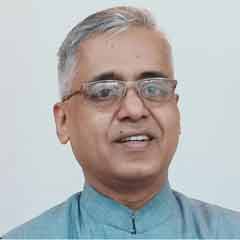Kottakkal’s PK Warrier: A radiant symbol of India’s soft power

Mail This Article
(This article was published when the Ayurveda Acharya had turned 100)
As the internationally-renowned Ayurvedic physician from Kerala’s Kottakkal, P K Warrier celebrates his birthday today (June 8), his own thoughts are sure veer round his uncle, P S Warrier, popularly known as “Sankunni” who founded the Arya Vaidya Sala (AVS) in Malabar 19 years before PK was born.
Precisely at the time of his birth, the “Variam” (as the households of the Warrier caste is called) was hosting refuge-seeking Muslims and Hindus under the same roof as it was the year of the Moplah Rebellion in Malappuram and surrounding places when the fine balance of communal relations had been broken because of mistrust and more.
The uncle, who became PK’s preceptor and mentor, was not merely a healer of diseases but also of ruptured relationships.

Both Hindu and Muslim women used to approach him for safe-keeping of their gold and valuables when communal tension was at its zenith. Even some of the harassed local police found safe haven at his home because his approach was essentially non-sectarian and against hatred or violence. So Hindus, Muslims and policemen found common ground at the “Variam”.
Imagine then the shaping of the character of a brilliant youngster who grew up in a scholastic environment but the tempest of the times could have been inescapable for PK . The nationalist movement had also caught his fancy. Though he started studying Ayurveda formally in 1940, it didn’t take long for him to realise that the institution his uncle had started was part of a larger Renaissance happening across India. Ayurveda was not just a branch of knowledge. It stood for Indianness and the resurgence of the spirit of Swadeshi.
“Kailasa Mandiram” where the almost 100-member joint family even now lives, bears a Cross, Crescent and Om on its façade. It was built in 1929. Young PK had this symbolism embedded in his heart.

PK’s association was with leaders like K Kelappan, A K Gopalan, K Damodaran and even Jayaprakash Narayan, who had then returned after studies on Sociology at the University of Wisconsin and Ohio State University in the US. No wonder, in his youth, his favourite reading was Hegels and Marx. Not the Ashtangahridaya of Vagbhata on which modern-day Ayurvedic formulary is based.
In fact, for one full year, in the wake of the Quit India movement, PK had discontinued studies and plunged himself into full time politics. Uncle PS was unruffled because he never wanted to thrust his profession on anybody in the family. However, he returned to resume Ayurvedic studies in 1943, a year before the legendary PS passed, leaving PK’s elder brother Madhavan to take over the reins.
But Madhavan lost his life in a plane accident in December, 1953. Next year, 32-year-old PK took over as the legatee of the institution and inheritor of the wealth of the KVAS body of knowledge.
In understanding the centenarian’s personality and his contribution to Institution building , his socio-political exposure during his turbulent Twenties is integral. No doubt, the senior Warrier himself had left a will that would prevent treatment and medication at the Kottakkal Arya Vaidya Sala (KVAS) from being a commercial proposition. It is the institution’s policy not to charge even a rupee as consultation fees. KAVS levies only the cost of the medicine and the treatment procedures irrespective of the ability to pay the patient.
In fact the Founder’s Will is so comprehensive that it also states that the Trust should not issue a cheque for payment unless there is credit balance in its bank account. Even an undrawn balance in its loan account would not be enough for the issuance of a cheque by the Trust!

While PS had laid the foundation, PK steered the Kottakkal Arya Vaidya Sala into an international institution. Today, there are millions of people across the world who have benefited from this ancient Indian treatment system’s holistic approach.
When we look back, there is something of a Ramakrishna-Vivekananda relationship to the uncle-nephew duo. PS, the Vaidya Ratnam (jewel among physicians) never crossed the seas whereas PK has travelled widely abroad. Early on, KVAS was popular in the erstwhile Malabar area but today its patients are global. One of the family’s eminent exponents of Ayurveda, Dr Ramesh Warrier, who for sometime headed the New Delhi hospital, goes every year to lecture at Germany’s Duesberg Essen University.

Respecting all systems of treatment, family head PK has been a silent but strong influence among India’s medical fraternity. Soon after Covid broke in the country, he wrote a brilliant approach paper in the highly respected Malayala Manorama daily that boosting of immunity is the best defence in the fight against the virus apart from other measures like sanitising of hands, masking and social distancing. He suggested “nimbaamrithaadi panchathiktam” as a means of raising body immunity in general. PK’s suggested medication is immuno-modulatory, anti-inflammatory and anti-viral in its effect which makes it the drug of choice in our context. The Indian Government’s AYUSH department (monitoring alternative treatment methods) accepted almost the same formulation as Ayush Kwath.
For the tiny southern State of Kerala, P K Warrier’s hundredth birthday today is not merely the celebration of an individual’s milestone in life. It is a re-validation of a key element of India’s soft-power, a nature-friendly system of medicine which has stood the test of time and also a renewal of an approach to treatment where compassion overwhelms commerce.
(S Adikesavan is Chief General Manager with SBI working from Thiruvananthapuram. Views expressed are personal.)


